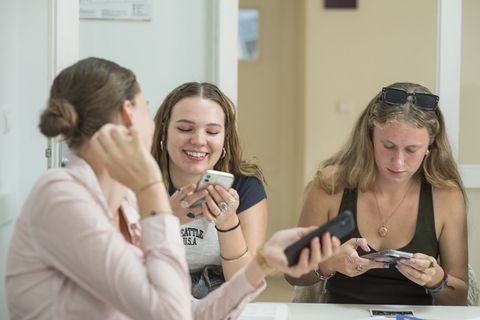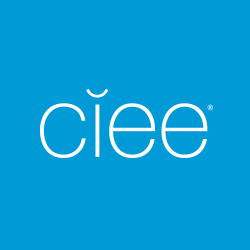In the Age of AI, Is Learning a Different Language Still Worth It?
Here's what travel looks like in the age of AI.
You're in a bustling street market overseas. You're trying to buy something delicious, but you're not quite sure what it is. You pull out your phone, snap a photo of a handwritten menu, and wait as an AI app does its thing. In a few seconds, you get a decent translation, point, and hand over money. Cool, right?
Thanks to tools like Google Translate, it's never been easier to communicate across languages. So, it makes sense to ask: if technology can translate anything for us, is it still worth learning a language?
Short answer: yes. Long answer? Absolutely yes.
Because even in the age of AI, there's something deeply human about learning to speak someone else's language. It's not just about getting from point A to point B. It's about connection, culture, confidence, and curiosity.
If you want to take a gap year abroad or even just travel internationally, learning the local language—even just the basics—is one of the most rewarding things you can do. Here's why.
What AI Can Do (and What It Can’t)
Let’s start with the obvious: AI tools are incredible. You can point your phone at a menu in Japanese or ask an app how to say, “Where’s the train station?” in French—and get a usable answer in seconds. These tools are helpful, fast, and only getting smarter.
But they’re far from perfect.
AI translation tools still make plenty of mistakes. They fumble slang, miss nuance, and sometimes mistranslate phrases entirely. They can’t tell when a word has a double meaning, or when a tone needs to shift from formal to casual. And they certainly can’t read the room.
More importantly, they can’t build a relationship.
AI can help you get by. But if you want to go deeper, to truly engage with the people and places around you, there’s no substitute for learning the language yourself.
The Benefits of Language Learning in the 21st Century

Learning another language is transformative.
For starters, it builds confidence. That moment when you successfully ask for directions or crack a joke in a second language? It feels incredible.
It’s also really good for your brain. Research shows that people who speak more than one language earn a range of benefits: improved academic performance, a more powerful memory, enhanced concentration, better communication skills, and more creativity, just to name a few.
And let’s bust a myth while we’re here: You can learn a language as an adult. Sure, it takes practice, but so does everything else worth doing. You don’t need to be fluent to have meaningful conversations, and you don’t need to be perfect to make a connection.
Language learning is also an incredible networking tool. It helps you build friendships, understand people more deeply, and navigate new places with curiosity instead of hesitation.
Plus, it’s just fun. Learning how to say something new, getting the pronunciation right, laughing at your mistakes—it’s all part of the journey.
Technology Isn’t the Enemy, It’s a Tool

AI and language learning don’t have to be at odds. In fact, some of the best language learners today are using AI to enhance their skills and get tips for learning a new language.
You can ask a chatbot to quiz you on vocabulary, check your grammar, or help you practice tricky sentence structures. You can use translation apps to get the gist of a conversation, then double-check how a native speaker might phrase it. It’s a great support system.
But that’s all it is—a support system. AI can’t replace the real-world trial and error that comes from speaking with locals, living in a new culture, or stumbling through your first conversation and realizing you survived (and maybe even made a new friend).
So, by all means, use the tools. Let them help you learn faster and more confidently. Just don’t let them do it for you.
Thinking About a Gap Year Abroad? Immersion Is the Best Way to Learn a Language

If you want to learn a language, there’s no better way than living it.
Immersion, through homestays, daily conversations, cultural excursions, and navigating a new place on your own, is where language truly sticks. It’s how vocabulary becomes second nature. It’s how grammar becomes a habit. It’s how confidence is built.
CIEE’s Gap Year Language & Culture programs are designed around this kind of learning. With local host families and everyday opportunities to speak and listen, you’ll gain fluency, independence, and a deeper understanding of the world.

